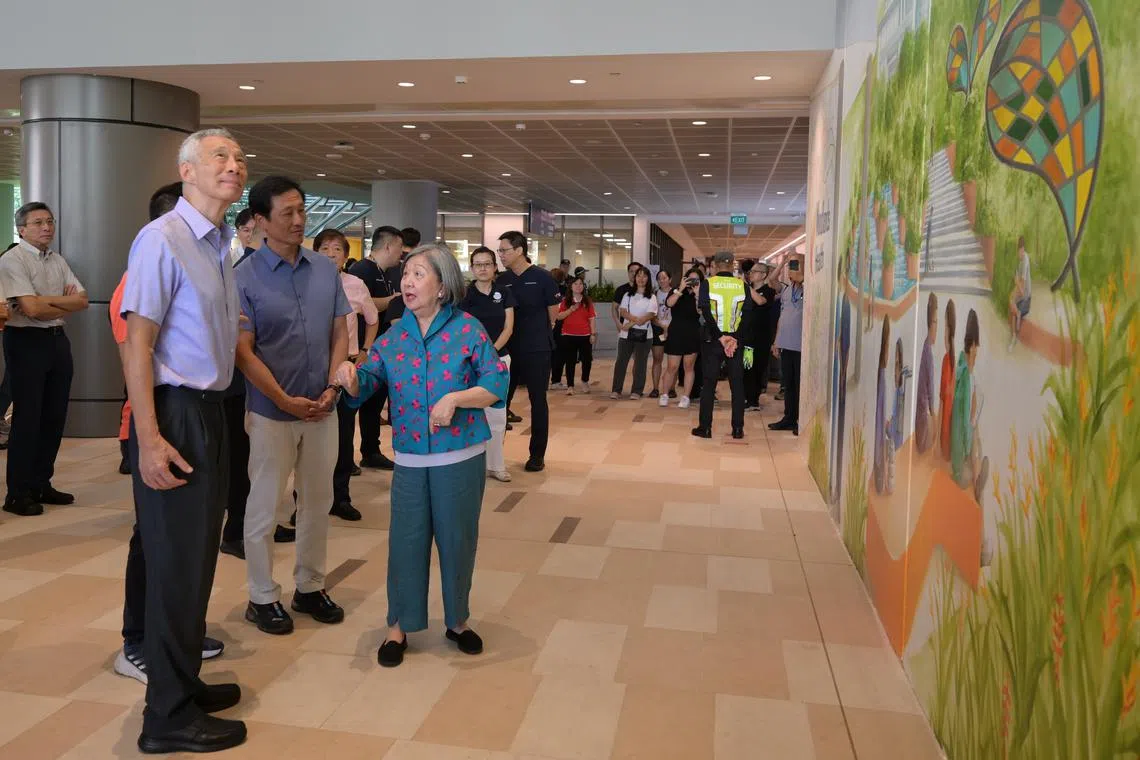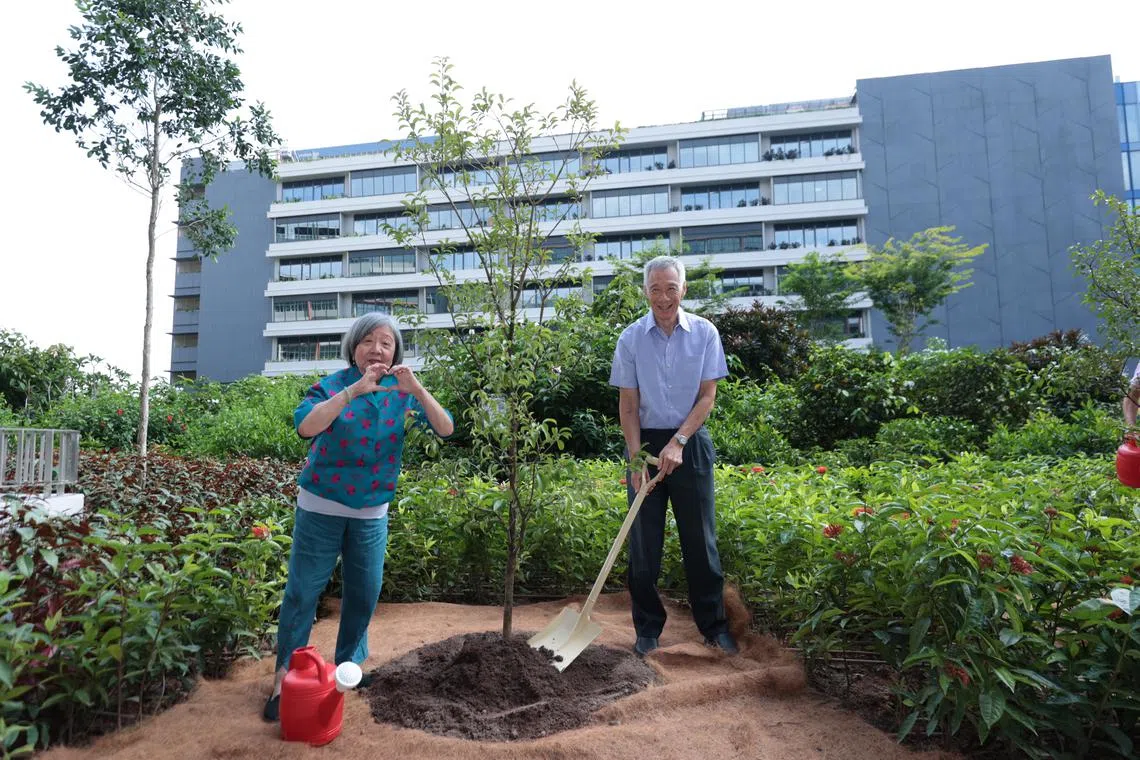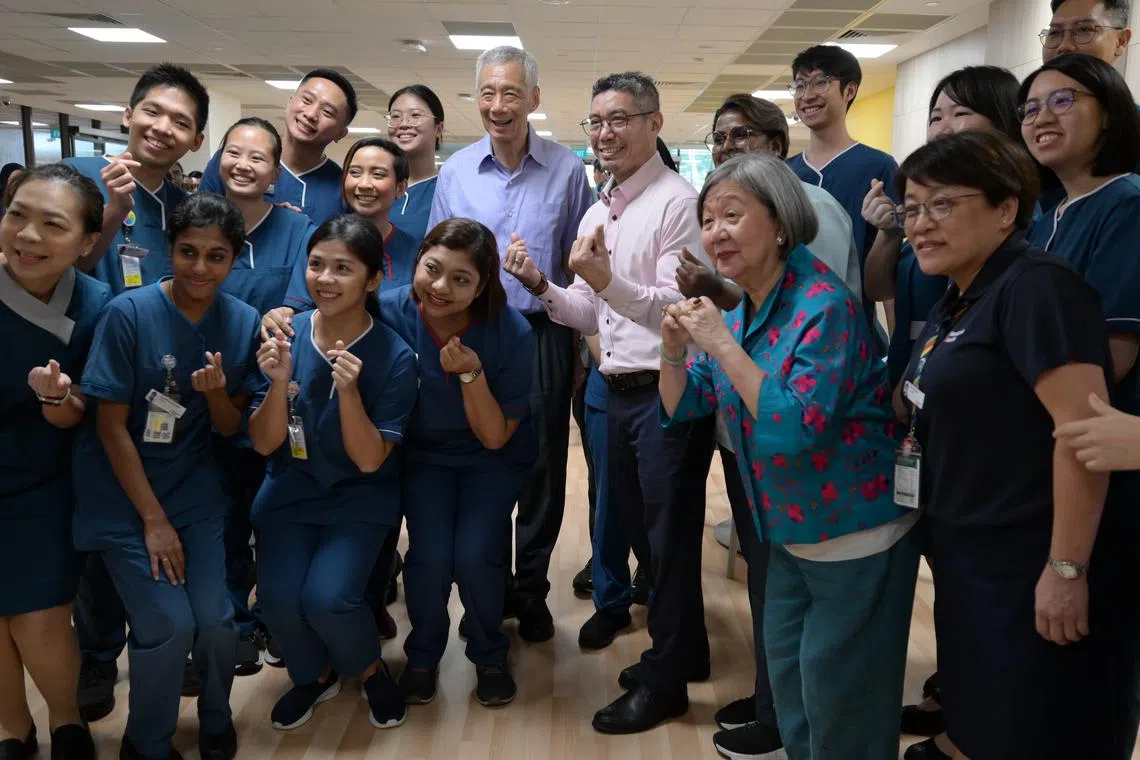Discipline in not over-treating and over-prescribing drugs will help manage healthcare costs: SM Lee
Sign up now: Get ST's newsletters delivered to your inbox

(From left) SM Lee Hsien Loong, Health Minister Ong Ye Kung and Woodlands Health campus chairman Jennie Chua at the hospital's official opening on July 13.
ST PHOTO: NG SOR LUAN
Follow topic:
SINGAPORE - Healthcare needs in Singapore will have to be managed not just by building new hospitals, but also through discipline in providing only what is necessary.
Speaking on July 13 at the official opening of the Woodlands Health (WH) campus
“We must also maintain discipline in not over-treating or over-prescribing, and be discriminating in adopting new medical treatments, procedures, drugs and technology, in order to keep our overall healthcare costs sustainable for the long term,” said SM Lee in outlining the path ahead for the healthcare system.
“At the same time, we must maintain the right mix of government subsidies, medical insurance and individual co-payment, to minimise wrong incentives, perverse incentives, which would lead to unsatisfactory outcomes.”
SM Lee said Singapore will continue to train more competent doctors, nurses and other healthcare professionals, and improve its healthcare facilities and infrastructure.
But he added that tough decisions and trade-offs are needed for the country to continue delivering high-quality, affordable healthcare to Singaporeans.
“There are too many examples elsewhere of healthcare services practically at breaking point. Populations suffer from poor healthcare delivery and long wait times, or exorbitant medical bills and high insurance premiums.
“And it shows in the outcomes – population health deteriorates, and so does the quality of life, even life expectancy,” said SM Lee.
Health Minister Ong Ye Kung, who was at the opening of WH, had also urged caution recently over the risks of escalating healthcare costs
In comments made on July 12, he said the Ministry of Health (MOH) needs to rein in the unhealthy “buffet syndrome”, which sees patients picking expensive treatments and diagnostic tests because they have insurance to pay for them.
Mr Ong said over-generous insurance coverage is a key driver of spiralling healthcare costs.
Over the last 10 years, Singapore has built three new hospitals – the 700-bed Ng Teng Fong General Hospital in 2015, the 1,000-bed Sengkang General Hospital in 2018, and now the 1,400-bed WH.
On the cards are another two public general hospitals – in Bedok and Tengah – and possibly also a non-profit private hospital.

Senior Minister Lee Hsien Loong and Woodlands Health campus chairman Jennie Chua planting a tree at the hospital’s opening ceremony on July 13.
PHOTO: LIANHE ZAOBAO
In less than five years, the ageing population here has pushed up the average length of hospital stay from six to seven days, which raises demand for hospital beds by 15 per cent.
SM Lee said the healthcare system remains in good shape, with people having access to high-quality and affordable treatments, with reasonable wait times.
But he added: “Do not underestimate the difficulty of keeping the healthcare system working well.”
Former health minister Khaw Boon Wan, who made the decision to build WH, was at the event on July 13.
He had instructed the team in charge of building the hospital to take their time and to study what other countries with older populations are doing.
Dr Jason Cheah, the hospital’s chief executive officer, said it took 10 years to build WH. Public hospitals here generally take seven years to complete.
A major reason for the delay was disruption to work and a shortage of labour as a result of the Covid-19 pandemic.

SM Lee said the healthcare system remains in good shape, with people having access to high-quality and affordable treatments, with reasonable wait times.
ST PHOTO: NG SOR LUAN
The hospital is designed to transform the way Singapore delivers healthcare services.
By integrating an acute hospital, community hospital and nursing home at a single campus, it makes it easier for WH to provide patients with the correct level of care.
SM Lee said that aside from the full range of hospital services, the hospital will also provide long-term care services including daycare, home care, and nursing home and palliative care.
“This makes it much easier to right-site patients, and also a lot more convenient for patients to transition seamlessly from treatment to convalescence, and receive the appropriate care in one place,” he added.
The hospital also uses technology to raise operational efficiency. It has an automated pharmacy and an automated laboratory for blood specimens, both of which reduce manpower needs and human error.
Patients are also provided with bedside terminals (PBTs) that allow them to engage more fully with their care plan.
Quipped SM Lee: “The PBT also functions like an inflight entertainment system where patients can order their preferred meals or even watch YouTube videos! Presumably, not too exciting ones.”
Thanking Ms Jennie Chua, chairman of the WH campus, Mr Lee noted that some of the touches that make it “a very woke hospital” must have come from her. Meals at the hospital include mutton vindaloo, plant-based mapo tofu and even Irish stew.
Ms Chua previously oversaw the establishment of the Khoo Teck Puat Hospital in Yishun.
Editor’s note: This article has been edited for clarity.


